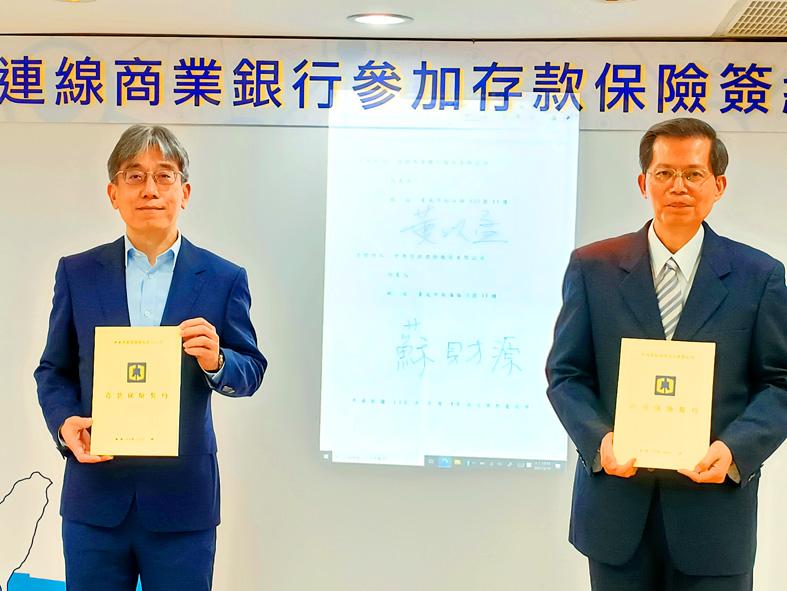Line Bank Taiwan Ltd (連線商業銀行), the second Internet-only bank in the nation, is to begin trial operations on Wednesday, before an official launch next month, Line Bank general manager Morris Huang (黃以孟) said on Friday.
The bank has completed several rounds of tests, such as stress tests, integration tests and user tests, and the bank is well-prepared to open to the public, Huang said.
The bank also signed an agreement with Central Deposit Insurance Corp (CDIC, 中央存保) to provide deposit insurance to its clients.

Photo: Lee Chin-hui, Taipei Times
Huang said that 700 employees of the three Taiwanese subsidiaries of Line Corp would be offered services in the trial.
As a Web-only bank, it has placed much emphasis on cybersecurity, Huang said.
The bank would initially offer debit card services and personal loans, but more preparations would be needed before credit card services could be offered, he said.
Once it offers services to the public, the bank would start with a promotion campaign, but it would not initially engage in price competition to achieve a certain market share, Huang said.
Line Financial Taiwan Corp (台灣連線金融科技), which owns 49.9 percent of Line Bank, last quarter started a similar Internet-only bank in Thailand — Line Bk — which has been faring as expected, Huang said.
The Thai bank’s performance would serve as a benchmark for the Taiwanese operations, he said.
Rakuten International Commercial Bank Co (樂天國際商銀), Taiwan’s first Web-only bank, opened in January, while Next Bank (將來銀行) is expected to become the third, as its application to begin operations is under review at the Financial Supervisory Commission.

South Korea’s equity benchmark yesterday crossed a new milestone just a month after surpassing the once-unthinkable 5,000 mark as surging global memory demand powers the country’s biggest chipmakers. The KOSPI advanced as much as 2.6 percent to a record 6,123, with Samsung Electronics Co and SK Hynix Inc each gaining more than 2 percent. With the benchmark now up 45 percent this year, South Korea’s stock market capitalization has also moved past France’s, following last month’s overtaking of Germany’s. Long overlooked by foreign funds, despite being undervalued, South Korean stocks have now emerged as clear winners in the global market. The so-called “artificial intelligence

‘SEISMIC SHIFT’: The researcher forecast there would be about 1.1 billion mobile shipments this year, down from 1.26 billion the prior year and erasing years of gains The global smartphone market is expected to contract 12.9 percent this year due to the unprecedented memorychip shortage, marking “a crisis like no other,” researcher International Data Corp (IDC) said. The new forecast, a dramatic revision down from earlier estimates, gives the latest accounting of the ongoing memory crunch that is affecting every corner of the electronics industry. The demand for advanced memory to power artificial intelligence (AI) tasks has drained global supply until well into next year and jeopardizes the business model of many smartphone makers. IDC forecast about 1.1 billion mobile shipments this year, down from 1.26 billion the prior

People stand in a Pokemon store in Tokyo on Thursday. One of the world highest-grossing franchises is celebrated its 30th anniversary yesterday.

Chinese artificial intelligence (AI) start-up DeepSeek’s (深度求索) latest AI model, set to be released as soon as next week, was trained on Nvidia Corp’s most advanced AI chip, the Blackwell, a senior official of US President Donald Trump’s administration said on Monday, in what could represent a violation of US export controls. The US believes DeepSeek will remove the technical indicators that might reveal its use of American AI chips, the official said, adding that the Blackwells are likely clustered at its data center in Inner Mongolia, an autonomous region of China. The person declined to say how the US government received